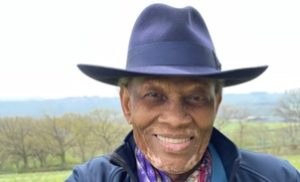Wilfred Emmanuel-Jones MBE, The Black Farmer and a member of the Royal Agricultural University’s (RAU) Governing Council, is to deliver this year’s annual Bledisloe Lecture at the University’s Cirencester campus.
In his lecture entitled “Jeopardy – the Danger of Playing it Safe”, Wilfred will speak about his own life story as well as his work to increase diversity in the UK’s food and farming sectors.
Wilfred, who was appointed as a Governor at the RAU earlier this year, said: “I am passionate about bringing more diversity to the food and farming industries but to do this requires courage and real commitment to change. I can’t think of a better place to raise this challenge than the RAU which has the power to influence this change.”
A child of the Windrush, Wilfred’s own life has been a series of challenges. His journey has taken him from Jamaica to a childhood of poverty in inner City Birmingham but with a love of the family allotment, a chef, a BBC producer and director, to becoming The Black Farmer.
More recently he nearly lost his life to Acute Myeloid Leukaemia but, thanks to a successful stem cell transplant, continues to thrive against the odds.
Black history month
The annual event, which takes place during Black History Month, will be held at the University’s Boutflour Hall on Tuesday 18 October starting at 6.30pm. RAU Vice-Chancellor Professor Peter McCaffery will introduce Wilfred and will then host a question and answer session at the end of the lecture.

Wilfred Emmanuel Jones
The prestigious lecture is named after eminent RAU alumnus Charles Bathurst, the first Lord Bledisloe (1867-1958) who was also Governor General of New Zealand in the early 1900s, who was deeply interested in agriculture and forestry and was one of the staunchest supporters of the then Royal Agricultural College.
It was held online, for the first time in its history, in November 2020 when broadcaster, writer, historian and RAU alumnus Jonathan Dimbleby interviewed Soil Association Chief Executive Helen Browning, to an audience of almost 300 people, about the role that food, farming and forestry must play in meeting the challenges of climate disruption, nature depletion and human health.





